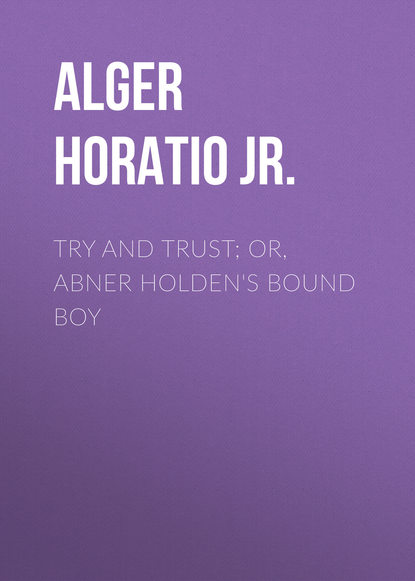По всем вопросам обращайтесь на: info@litportal.ru
(©) 2003-2024.
✖
Try and Trust; Or, Abner Holden's Bound Boy
Настройки чтения
Размер шрифта
Высота строк
Поля
One day, about a fortnight after Herbert’s arrival, a gentlemanly-looking stranger knocked at Abner Holden’s door.
The call was answered by the housekeeper.
“Is Mr. Holden at home?” he inquired.
“Yes, sir,” was the reply.
“I should like to see him.”
Abner Holden soon made his appearance.
“Mr. Holden.” said the stranger “I am in search of a good family horse. I am told that you have some animals for sale, and called on you, thinking I might get suited through you.”
“You’ve come to the right place,” said Abner, glibly. “I’ve got just the animal that will suit you.”
“I should like to see it.”
“He’s in the pasture now. If you don’t object to walking a short distance, I will show him to you. I feel sure he will suit you.”
“Very well, I will go with you.”
“This way, then.”
The two walked down a green lane at the back of the house to the entrance of the pasture, where the three horses, at present comprising Abner Holden’s entire stock, were grazing leisurely.
Now, it happened that, of the three, the blind and vicious horse was much the best looking. He held his head erect, had a graceful form, and was likely to attract favorable notice at first sight.
Abner Holden paused at a little distance, and pointed him out.
“What do you think of that horse, Mr. Richmond?” he said.
“A very good-looking animal,” said the stranger, with an approving glance; “but I must explain that I want such an animal as my wife can drive. It is absolutely necessary that he should be good-tempered and gentle. If, with this, he is handsome, and of good speed, all the better. Now you know what I am in search of. Can you recommend this horse of yours?”
“Yes,” said Abner, confidently, “he will just suit you. I did calculate to keep him for my own use, but I’m rather short of money, and I shall have to let him go.”
“You say he is gentle?”
“Oh, yes, as gentle as need be.”
“Could a woman drive him?”
“Oh, no trouble about that,” said Abner.
“And he has no serious defect?”
“No.”
“Well, that seems satisfactory. I like his appearance. He would look well in harness. What is your price?”
“Two hundred and fifty dollars, cash down,” said Abner. “That’s too cheap. He’s worth a cool hundred more, but I got him cheap, and can afford to sell him cheap.”
The horse had cost Mr. Holden just a hundred and ten dollars, and at this price he considered himself decidedly taken in; but this he did not particularly care to mention.
“Two hundred and fifty dollars!” mused the stranger. “It is a little more than I intended to pay. Still, if the animal is what you describe, I don’t know that I shall object on that score.”
“You had better take him,” said Abner. “It’ll be the best bargain you ever made, I’ll warrant. You’ll pay cash down, I suppose?”
“Of course.”
“Then shall we say it’s a bargain?”
“Not quite yet. I’ll take till the afternoon to think about it.”
“Better decide now. The fact is, Mr. Richmond, I ought not to let the horse go at that figure, and I may change my mind.”
“I think I shall take your horse, but I have agreed to look at another, and must see that first.”
“Whose?”
“It belongs to a man named Nichols.”
“Sam Nichols?”
“I believe so.”
“I wouldn’t advise you to have anything to do with him.”
“Why not?”
“He’s a regular sharper. You can’t depend on anything he says.”
“Thank you for the caution. I will be on my guard. But I promised to take a look at his horse before deciding. If I don’t come to terms with him, and I don’t think I shall, I will come round some time this afternoon and make a bargain with you.”
Mr. Holden thought it was hardly politic to urge him farther. With a renewed caution as to dealing with Sam Nichols, he let him go.
“Well,” thought Abner, after he was gone, “it will be a pretty good thing if I get rid of Spitfire”—he had named him thus—“for two hundred and fifty dollars. He’s a bad-tempered brute, and blind into the bargain. But I’m not bound to tell Mr. Richmond that, and so spoil my trade. I’ve put a flea in his ear about Nichols, and I guess he will be back again.”
The prospect of making a good bargain caused Abner to be unusually pleasant and good-humored, so much so that Mrs. Bickford regarded him with surprise. He voluntarily asked her if she did not wish something at the store, volunteering to bring home whatever was needed.
“What’s come over the man?” thought the housekeeper. “It’s too good to last.”
She was quite correct there. Mr. Holden was naturally crabbed, and fair weather with him was the exception rather than the rule. On the present occasion it did not last many hours.
Abner Holden went to the store, but made other calls on the way, so that he was three hours absent, and did not return till twelve o’clock, the usual dinner hour in his household.
Meanwhile, Mr. Richmond, his caller of the morning, had been to see Sam Nichols, and inspected the horse he had for sale. He did not altogether like its appearance, and, moreover, he was prejudiced against him by what he had heard from Abner Holden, and came away without effecting a purchase.
“I don’t think I can do better,” he reflected, “than to take that horse of Holden’s. Let me see, it is only half-past ten. I shall have time to go up there this morning. I suppose I might as well settle matters at once.”











